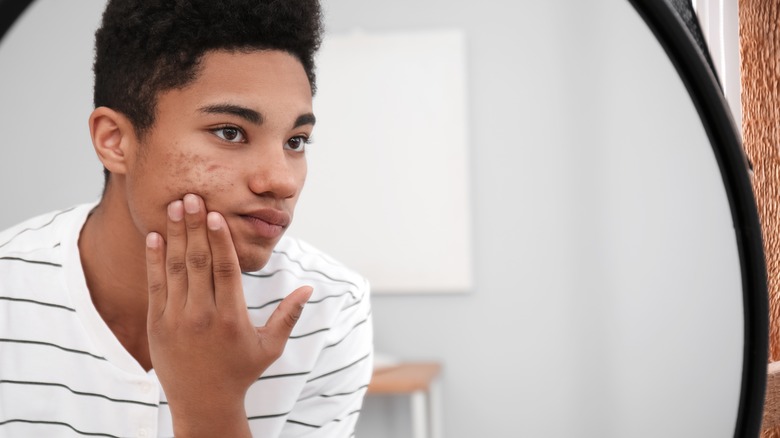Eczema Versus Acne: What's The Difference?
Eczema and acne are two different skin conditions that can cause redness, itchiness, and breakouts. While they share some similarities, there are also some key differences. Eczema is a chronic condition that causes the skin to become dry, cracked, and inflamed (via Mayo Clinic). Also called atopic dermatitis, eczema is often triggered by environmental factors such as contact with irritants or allergens. It can occur anywhere on the body, but it is most commonly found on the face, neck, hands, and feet.
There is no cure for this skin condition, but treatments can help to reduce symptoms and keep flare-ups under control. Some at-home treatments include using moisturizers to keep the skin hydrated, avoiding triggers (such as harsh soaps or chemicals), and using gentle cleansers. If these methods don't work, a person may need to see a doctor for prescription medication. Identifying your triggers and avoiding them can also keep your eczema under control.
How acne differs from eczema
Like eczema, acne is an inflammatory skin condition. However, the causes, symptoms, and treatment options for acne are all different than for eczema. Acne is caused by excess oil production, clogged pores, and bacteria (via Mayo Clinic). This can happen due to many factors, including stress, washing your face too much, not cleaning your phone, hormones, and more. The most common symptom of acne is pimples, but acne can also cause blackheads, whiteheads, and cysts.
Treatment for acne often includes topical medications, oral medications, or a combination of the two. Your best treatment option will also depend on the type of acne you have. If you tend to break out near your period, for example, you may have hormonal acne, which is often treated with birth control. Acne that is caused by stress can be treated topically, but you will see the most success if you remove as much stress as possible from your life. Speak with a dermatologist if you have acne and you can't figure out how to treat it.


